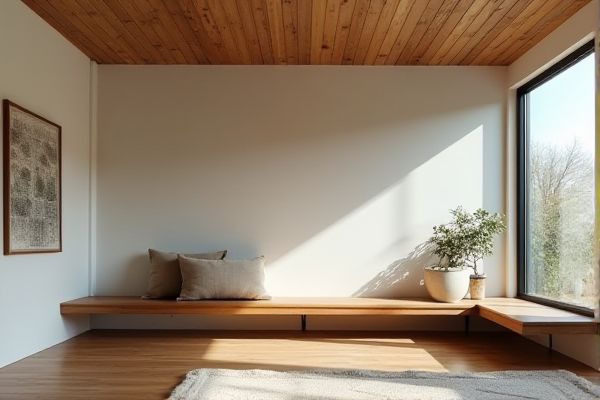
Modular benches offer flexible configurations that can be easily adjusted or expanded to fit varying spaces and needs, whereas fixed benches provide a sturdy, permanent seating solution ideal for consistent layouts. Discover which bench type best suits Your environment by exploring the full article.
Table of Comparison
| Feature | Modular Bench | Fixed Bench |
|---|---|---|
| Flexibility | Highly customizable and adjustable | Permanent structure, no adjustments |
| Installation | Easy to assemble and reconfigure | Requires fixed installation, difficult to move |
| Cost | Generally higher upfront cost | Lower initial cost |
| Durability | Moderate, depends on materials and joints | Highly durable, solid build |
| Space Efficiency | Optimizes space with adjustable layout | Fixed footprint, less adaptable |
| Maintenance | Requires regular checks on connectors | Low maintenance due to solid construction |
| Use Case | Ideal for adaptable workspaces and changing needs | Suitable for consistent setup and heavy use |
Introduction to Modular and Fixed Benches
Modular benches offer customizable configurations, allowing users to rearrange components for specific needs, enhancing flexibility in workspace design. Fixed benches provide permanent, sturdy setups ideal for consistent, repetitive tasks, ensuring stability and durability. Choosing between modular and fixed benches depends on the requirement for adaptability versus long-term robustness in industrial or laboratory environments.
Design Flexibility: Modular vs Fixed Benches
Modular benches offer superior design flexibility through customizable components that can be reconfigured to fit various spatial layouts and user needs, unlike fixed benches which have a permanent structure and limited adaptability. Modular benches support easy expansion or reduction in seating capacity, making them ideal for dynamic environments such as offices, public spaces, and event venues. Fixed benches provide stability and often cost less upfront but lack the versatility needed for evolving design requirements.
Space Optimization Comparison
Modular benches offer superior space optimization by allowing flexible configurations that adapt to varying room sizes and layouts, maximizing usable space efficiently. Fixed benches, with their permanent dimensions, often limit spatial rearrangement and can lead to underutilized areas, especially in smaller environments. Choosing a modular bench enables you to customize seating arrangements to fit your space perfectly, enhancing both functionality and aesthetics.
Installation and Assembly Differences
Modular benches offer greater ease of installation with separate components that can be quickly assembled or reconfigured on-site, minimizing labor time and complexity. Fixed benches require a more permanent installation, often involving anchoring to floors or walls, which can extend assembly time and limit future repositioning. Your choice depends on whether you value rapid setup flexibility or long-term stability in your work environment.
Customization Options: Which Bench Wins?
Modular benches offer superior customization options with adjustable components such as seat height, backrest angle, and interchangeable attachments, allowing personalized configurations to target specific workouts and accommodate different user preferences. Fixed benches provide limited customization, typically featuring a static design with predetermined padding and angles, which restricts versatility but ensures sturdy support during exercises. For users prioritizing tailored functionality and adaptability, modular benches clearly win in customization capabilities.
Durability and Maintenance Considerations
Modular benches offer enhanced durability due to their interchangeable components, allowing you to replace worn parts without discarding the entire bench, which reduces long-term maintenance costs. Fixed benches typically feature a solid, single-piece construction that withstands heavy use but can be more challenging and expensive to repair when damaged. Choosing a modular bench provides the advantage of easier upkeep and extended lifespan by enabling targeted maintenance on specific sections.
Cost Analysis: Modular Bench vs Fixed Bench
Modular benches typically have a higher upfront cost due to their customizable components and flexible configurations, while fixed benches offer a lower initial investment with their simple, one-piece design. Over time, modular benches can provide cost savings by adapting to changing needs without requiring full replacement, reducing long-term expenses. Your choice between modular and fixed benches should consider both immediate budget constraints and future adaptability requirements.
Suitability for Various Environments
Modular benches offer unmatched adaptability, making them ideal for diverse environments such as offices, outdoor parks, or public waiting areas where space and layout requirements frequently change. Fixed benches, while sturdy and durable, are best suited for permanent installations in controlled environments like school hallways or fixed seating zones in auditoriums. Your choice depends on whether you prioritize flexibility and reconfiguration or long-term stability tailored to a specific setting.
Aesthetic and Style Variations
Modular benches offer versatile aesthetic options, allowing you to customize configurations, colors, and materials to suit evolving interior designs. Fixed benches provide a consistent, solid appearance with streamlined designs that often enhance traditional or minimalist spaces. Your choice between modular and fixed benches will influence the visual harmony and adaptability of your living or working environment.
Conclusion: Choosing the Right Bench for Your Needs
Modular benches offer versatile configurations and adaptability for dynamic workspaces, while fixed benches provide sturdy, permanent setups ideal for consistent tasks. Your choice depends on the specific requirements of space flexibility, workflow efficiency, and budget constraints. Evaluating these factors ensures you select the bench that best supports your productivity and workspace optimization.
 homyna.com
homyna.com